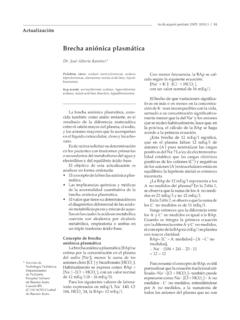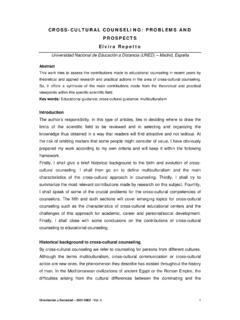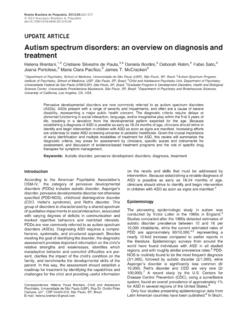Transcription of Costs in the Public Sector importance in relation to …
1 Costs IN THE Public Sector importance IN relation TO budgeting Tiberio Julio Cesar Universidad de Buenos Aires Facultad de Ciencias Econ micas Av. Corrientes 6041 - 2do. Piso - Dto. B : 1414 - Ciudad Aut noma de Buenos Aires Email: SUMMARY This paper has the intention to disclose the importance of the treatment of Costs in the Public Sector , making known the necessity to analyze in depth and to think on the importance of its correct use, in order of satisfying the greater amount of possessions and services that the State (Nation -Provinces - Municipalities), through its government programs, included annually in the Public budget, allow to make specific the demands that the population has a right to receive, as it contributes the necessary resources for such an aim.
2 For that, papers by distinguished professionals were selected, who have noticed the importance that the subject deserves. Also methods or systems of Costs were incorporated that will allow to make a specific budgetary proposal whose priority is based in the effectiveness, the efficiency and the economization in the obtaining of the Public resources, and the destination of the expenses that allow the fulfillment of the foreseen goals for the fulfillment of the purposes that have as a non delegable objective, to obtain the well-being of the population. Considering that the university studies plans, of the Economic Sciences do not often emphasize the importance of the Public Sector , specially in the Public Accountant s one, it is considered necessary that the students and the young professionals notice the importance of handling the " Public matter " has, and the strict relation that exists between paying tribute - evasion - expenses and Costs necessary to satisfy the necessities of the community, which is the reason of our preoccupation.
3 KEY WORDS: Budget, Cost, Expenses, Well-being, Community INTRODUCTION When writing the book Casos Pr cticos de Contabilidad P blica" that we published together with Professor Horacio Francisco Mastrantonio in 1990, with the support of Macchi Editions, we treated the matter of the Costs in programming the Public Budget. In it when expressing a concept of Budget for Programs we pointed out: "it is the expression of the budgetary allocations, practiced based on government plans, for a certain period in the different scopes of its competence, so as to obtain the maximum fulfillment of such, at the minimum cost" Taking into account very specially, at that time, the importance that the "Norms for the Preparation of the Budget" fixed by the National Secretary of Property, gave to two specific subjects, for the application of the scheme of Budget for Programs: Costs and management control: In this paper we will refer to the first one mentioned, to which we pointed out.
4 "As an integral part of the budget for programs, it is necessary to count on a system that allows measuring the cost of the different programming levels". The use of this system will make possible to establish the degree of efficiency in the fulfillment of the program, and will have to adapt itself to the different detail modalities in agreement with the characteristics, importance and aims of each institution ". "The budgetary system allows coming near to the Costs through the foreseen or carried out expenses, grouped by means of the economy classification and by object of the expenses." "The total cost of a program or activity will be given by the expenses foreseen or carried out in its execution, adjusted based on the differences (social Costs or of opportunity, consumption or use of the goods, amortization, etc ) and, of the indirect Costs originated in the expenses of those programs, fundamentally of management and administration, whose action is of support to another set of programs, among which they must be distributed ".
5 The unit cost will arise from the relation of the goal of the program or quantified result of the activity through some measurement unit, and the cost necessary to obtain them ". In the same publication when the general features were included on the elaboration of the Budget for Programs and very specially the advantages of their application which Gonzalo Matner in his book " Planificaci n y Presupuesto por Programas Published by Editorial Siglo XXI - M xico 1971, describes very accurately, pointing out as to the subject of this paper: "Opportunity to reduce Costs " Following the analysis of other writers we can indicate, that from a general point of view, cost is synonymous of effort. This definition is sufficiently ample to involve so much the physical, moral and intellectual effort as the economy one.
6 But while the first are not measurable in value units, although their consequences can be so, the economy effort is always represented in that way. Economically, then, cost is synonym of expense, that is to say, of sacrifice. But that sacrifice must have been produced to reach a determined objective, which originally differentiates the cost from a simple or pure loss that depends on eventual factors or others, independent to reach a determined objective. From the aforesaid matter it arises that, economically speaking, cost is the wealth sacrifice that is incurred in, so as to reach a certain objective. As the objectives vary according to the characteristics of the entities that persecute them, we will try to classify the entities in function of these objectives, in order to primarily interpret the characteristics of the erogations in which they incur, that is to say, its Costs .
7 The entities (and their patrimonial representation, the properties) of expenditure have as their main objective the satisfaction of their necessities. There are private and Public , being able the first of being as well as individual or collective. The typical entity of individual private expenditure is the individually considered human being. Its objective is the satisfaction of its necessities and the activity that it tends to obtain it. The erogations in which it incurs in, , their cost, commonly take on the form called "cost of living . They are simple expenditures. that represent, in almost all the cases, decreases in the patrimony of the entity directly when they are incurred in. In the same way it happens with the entities of expenditure private collective.
8 Such as can be a civil association of mutual character. Its objective is the satisfaction of the necessities of the communities and the expenditures. which it incurs in, for that constitutes the cost of the mutual service it renders. Its objective is the satisfaction of the necessities of the community which they represent and the expenditures, that they do for that, constitute the cost of the management of the Public matter and the rendering of the communitarian services. The activities that the States develop to fulfill these objectives can be more or less complex and it will affect, of course, in the conformation of the expenditures, in which they incur. The distinguishing characteristic of the three types of entities that we have mentioned is the absence of the aim of profit.
9 When this one appears, , when the objective of the entity is the increase of wealth, we are in the presence of the entities (and their properties) of production. The production concept coincides here, with the one of increase of wealth. Considering the aforesaid matter, the economy cost is not only the sacrifice of present wealth, but also of concrete expectations of future wealth. Economy cost is, therefore a synonym of economy sacrifice. In our scope of action, that of Economic Sciences, the economy objective of the activity being developed, must never be lost. Thus the study of the cost in itself constitutes but only a theoretical version, devoid of usefulness. Its determination and control must be done based on the best fulfillment of the objective of the entity which it incurs in.
10 Thus, in the expenditure entities, it will be done based on the most rational satisfaction of the necessities; and in those of production, in function of the most rational way of obtaining profit. If we wanted to condense in one only definition, all the analyzed concepts, we could say, without pretending that it is the best one that: Cost is the economy sacrifice originated in the development of a certain activity, through which one searches to fulfill with the given objective. Finally it is possible to say, when speaking of cost in general; one does not particularize with respect to the total or partial fulfillment of the objective or to the total or partial development of the activity. But one sees that both references are implicit in the definition which we have given, so that it includes so much the concept of total, global cost, , referred to the universe activity or the fullness of the objective, like the one of unit cost, , referred to each of the units in which the universe can be divided.
















